Adopting an open smart city lens, the Community Solutions Network Research Briefs provide formidable insights into how data and technology intersect with challenges local communities are grappling with as well as key considerations for policymakers and practitioners.
A year into the pandemic, COVID-19 continues to redefine the place of technology in our daily lives, radically transforming the way we work, live, and learn. This shift prompts local governments and communities to consider, more than ever, the opportunities and pitfalls presented by data and emerging technologies.
The pandemic has put considerable strain on local governments and communities trying to provide remote service delivery in times of crisis. In addition, municipalities and communities also need to respond to the issues the pandemic has exposed and exacerbated (such as gaps in public health measures, economic inequalities, and barriers faced in online education). Meanwhile, governments must continue building capacity for residents to meaningfully understand and engage with smart city projects. Last summer, our consultation organized conjointly with the Standards Council of Canada revealed a strong appetite for more open and shared data.
As Canadian communities across the country explore open smart city initiatives, there is a pressing need to grasp the risks and opportunities of data and technologies. Open North is delighted to share with you seven research briefs. We are also taking this opportunity to announce the launch of our Summer Series Webinars on Open Smart Communities: Emerging Issues further discussing the themes covered in the research briefs.
Finally, we would like to thank the brilliant authors without whom the research briefs would not have been produced: Anna-Liisa Aunio, Anne Marie Aubert, Bianca Wylie, Danielle Lenarcic Biss, Donato Leone, Julie Ivanoff, Matthew Claudel, Olivia Faria, Pamela Robinson, Rachel Begg, Sophie Nitoslawski, and Tracey P. Lauriault.
Unveiling Seven Smart Cities Research Briefs
Nourishing Smart City Solutions: Data Collaboration and Food Policy By Anna-Liisa Aunio, Anne Marie Aubert, and Rachel Begg
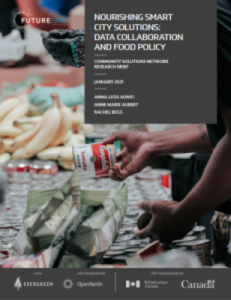
The pandemic underlined the critical role of local governments and grassroots organizations in rapidly responding to complex economic and social challenges, which requires collaboration across a wide range of actors with varying degrees of knowledge and capacity to meet local community needs.This issue briefing explores the issue of data collaboration among local community partners, drawing lessons from efforts to address food insecurity during the first wave of the COVID-19 pandemic in Montreal.
Shared Mobility in Canada: Considerations for Open Smart Cities By Tracey P. Lauriault, Donato Leone, and Julie Ivanoff
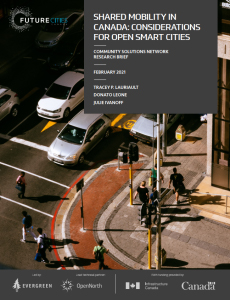
From Uber to bike shares, the emergence of shared mobility services in the past few years has begun to disrupt and reshape transportation in local markets. As new services emerge and become increasingly more complex and interconnected, it’s critical that we consider an open smart cities lens in shaping their governance and use. Decision makers must consider how these new technologies and its associated data can be governed in a fair, ethical and transparent manner to meet the economic, social and environmental needs of communities.
Parks and Open Spaces: Challenges and Opportunities of Smart Technologies By Danielle Lenarcic Biss and Pamela Robinson
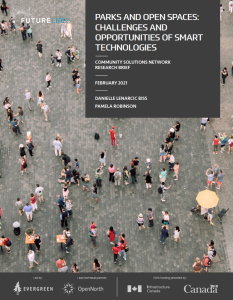
The public sphere shapes the urban experience and is a major area of discussion as communities balance the need to provide ample space for the public, as well as drive land use intensification. The COVID-19 pandemic has also demonstrated the importance of shared public spaces. As cities explore digital placemaking, public Wi-Fi, and install sensors in streets and plazas, it is necessary to examine the risks and opportunities of these technology options.
Smart Home Technology-Facilitated Violence By Olivia Faria and Tracey P. Lauriault
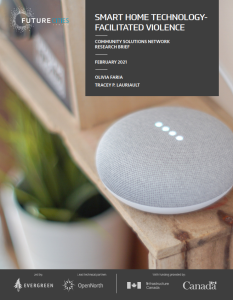
As the adoption of IoT devices such as smart cameras, smart speakers, and smart doorbells grows, this issue becomes increasingly urgent for multiple levels of government. This issue briefing describes the challenges that arise when smart home technologies are used for abuse and violence, which is known as smart home technology-facilitated violence (SH-TFV).
The State of Good Repair: Maintenance & Innovation in Smart City Projects By Pamela Robinson

Smart city initiatives must be considered in tandem with existing and future planned infrastructure investments, especially as communities account for sustainability and historically exclusionary patterns of investment. The issue briefing poses a simple yet powerful question: What would a state of good repair look like in an open smart city? Using the State of Good Repair municipal standard as a starting point, this issue briefing highlights the infrastructure deficit in Canadian municipalities and frames the issue of infrastructure repair and planning in the context of investments in digital infrastructure.
Technology Procurement: Shaping Future Public Value By Matthew Claudel and Bianca Wylie
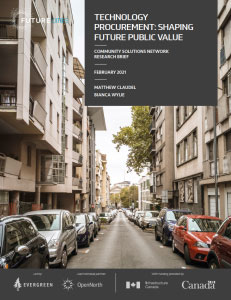
New technologies are raising a wide range of uncharted digital rights and digital governance issues, while also challenging long-established processes, sectoral relationships, and power structures in municipalities. This issue briefing tackles the long-standing problem of ensuring that technology procurement leads to long-term public value to city governments and residents. It does so by framing technology procurement as a space of defining future public value, while also identifying tactical issues for communities that are adapting to a new landscape of technologies and business models.
Managing Urban Green Infrastructure for Climate Change Through a Smart City Lens By Sophie Nitoslawski
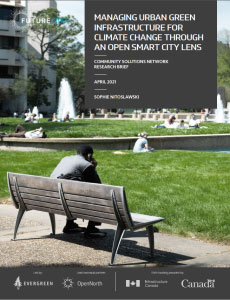
This research brief provides a smart city lens to natural asset planning and encourages municipalities to consider how data and technology can be leveraged to improve efficiencies and achieve sustainability objectives. Using four key concepts of the smart city (openness, integration, transferability, and accountability), the author explores how these concepts can be used in practice in natural asset planning with examples from communities across the country.
About the Advisory Service
We work alongside our partners’ teams to assess your needs, define problems, mobilize research and knowledge, design solutions and support their implementation. Our expert staff works with a roster of advisors in all our areas of expertise to offer advisory services to municipalities and organizations across Canada. Workshops, webinars, online courses – we’ve created all the capacity-building tools you’ll need in order to help you develop innovative data and tech solutions to benefit your community.
Interested in our Advisory Service? Get help to launch your smart cities projects.